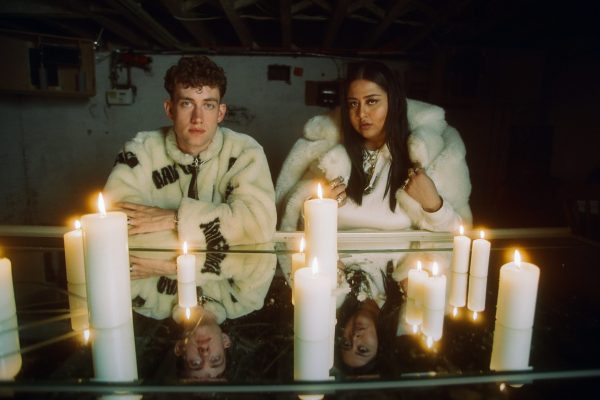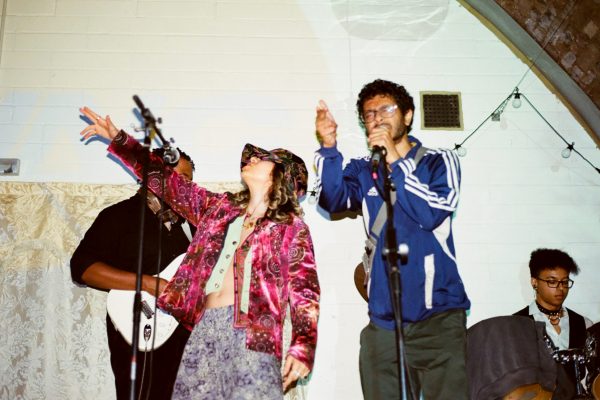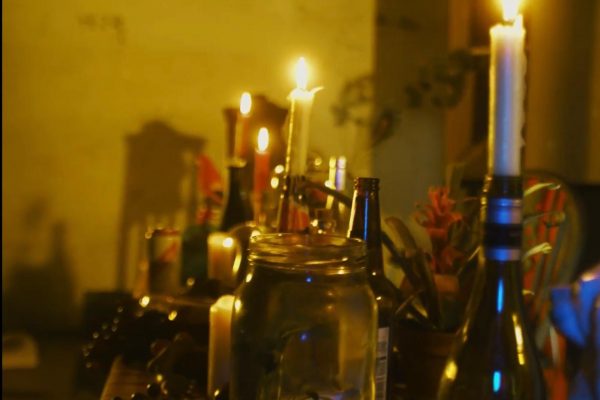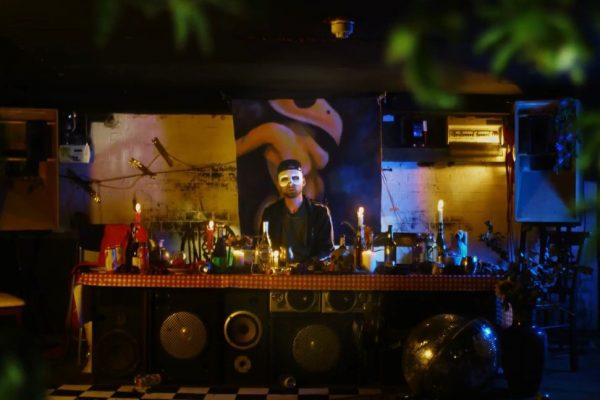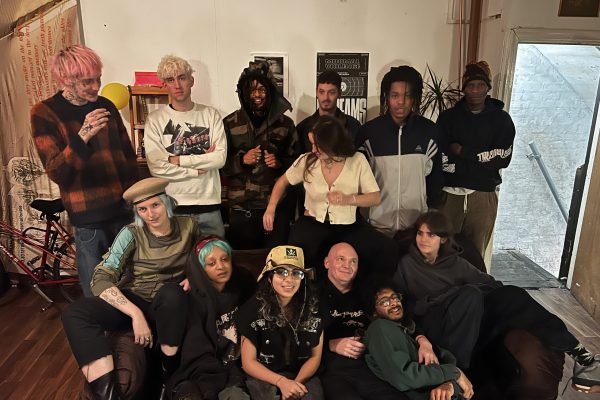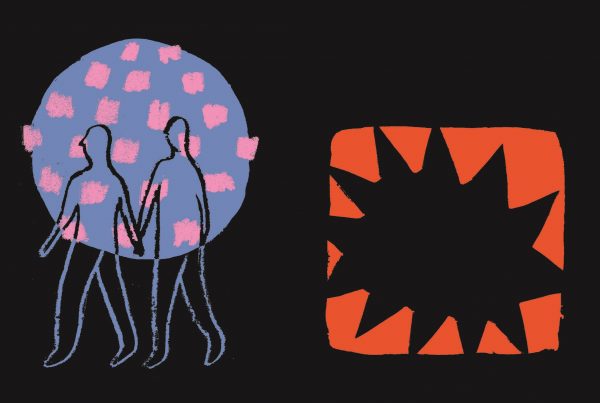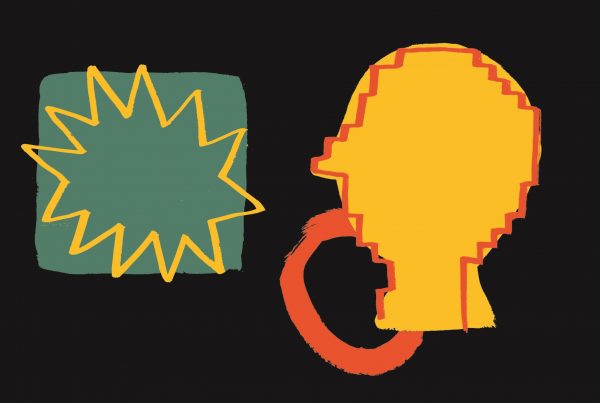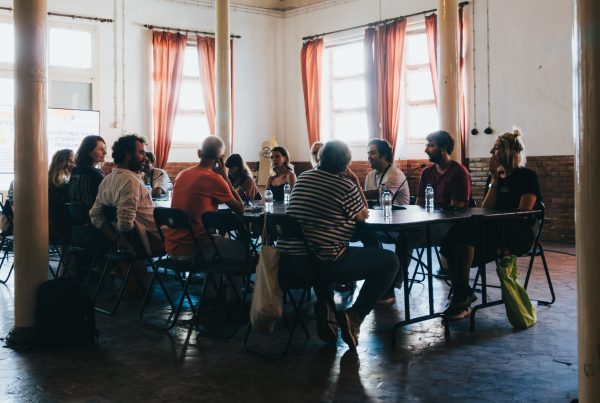
/ Soup Kitchen Club © Hayley Rawlings
Techno em Tbilisi, singeli em Dar Es Salaam, footwork em Chicago: o fascínio de uma cena autónoma e viva com a sua própria linguagem musical e gramática cultural assegura que os movimentos locais raramente permanecem locais por muito tempo. Na música underground, a ideia do local é altamente valorizada, mas sempre rejeitada. Depois de se descobrir algo novo e exótico, o primeiro impulso é o de exigir um escrutínio mais atento, dando início a um processo familiar de absorção e apropriação.
Mas o que é que a ideia de uma cena local fértil tem de tão apelativo? Há a novidade, claro, e a nossa curiosidade sobre que tipo de arte está a ser feita noutros lugares. Uma cena local implica também uma comunidade da vida real, uma história em evolução em co-autoria com muitos outros – uma teia de ligações afectivas e de relações significativas, tudo isto desencadeado em espaços reais onde os corpos se misturam, dançam e suam juntos. A percepção da autenticidade destas relações também contribui para o seu apelo. Muita gente quer fazer parte de cenas locais como esta. À medida que emergimos, gradual e desigualmente, do confinamento, temos uma oportunidade inesperada para pensar em como construí-las, não só porque são inovadoras ou exploráveis, ou mais divertidas, mas também porque precisamos de uma vida à prova de futuro.
Quando a pandemia surgiu, no meio do pânico inicial, houve uma nota de alívio entre alguns trabalhadores da indústria da música. Muitos viajantes cansados ficaram gratos pela pausa forçada dos palcos e do custo mental do trabalho numa indústria precária – talvez também cada vez mais atentos aos danos ecológicos associados às digressões. Um cálculo há muito esperado com o racismo endémico da indústria foi catalisado (embora ainda mal tenha começado) pelo movimento a favor das vidas negras. Dezoito meses mais tarde, ao tornar-se claro que a Covid-19 não vai ser erradicada, surge a possibilidade de novos bloqueios e encerramentos de fronteiras, comprometendo a frágil recuperação da indústria. Isto soma-se ao Brexit, que colocou novos e dispendiosos entraves aos artistas do Reino Unido em digressão. Tudo isto enquanto assistimos a um clima extremo em todo o mundo, obviamente alimentado pela ruptura climática. Este é o pano de fundo para uma nova era. Estamos a viver o século XXI que temíamos: ardente, caótico, e politicamente polarizado.
No início deste ano, o colectivo de acção climática Clean Scene, com base em Berlim, defendeu uma recuperação pós-Covid que tomaria a emergência ecológica como ponto de partida e não como nota lateral. Um relatório do grupo mostrou que a pegada média de carbono de um DJ em digressão é 17 vezes superior ao que a nossa pegada individual teria de ser para evitar que as temperaturas globais subissem acima dos 1,5 graus. Apelando a uma maior responsabilização de uma indústria que lucra com sistemas «directamente relacionados com os efeitos das alterações climáticas», o relatório da Clean Scene vai além das soluções individuais ou tecnológicas para apelar ao desmantelamento completo de «sistemas que dão prioridade ao dinheiro, poder e ganância à custa do clima, das questões de raça e género e da desigualdade económica». Tais propostas parecem muito distantes do regresso desarticulado às normas de procedimento dos clubes que temos visto até agora. Voltar à pista de dança e restabelecer a ligação com a nossa comunidade tem tido prioridade sobre uma avaliação honesta do nosso impacto sobre o ambiente. Mas talvez isso seja tão justo como inevitável, pelo menos por agora, numa altura em que voltámos a poder estar novamente juntos.
O ano passado foi de uma enorme tensão para músicos e para trabalhadores da música que tiveram de lutar para se manter à tona, mas também nos deu tempo para considerar respostas mais sérias, estruturais e de longo prazo aos desafios que as cenas musicais já enfrentam – desde o aumento das rendas a questões de licenciamentos, de segurança, de inclusões e de equidade, ao desafio de simplesmente fazer com que os fins se cumpram.
Um requisito para uma cultura musical revitalizada e localizada é a ênfase em programar e dar prioridade a artistas locais e residentes em detrimento de artistas em digressão. Como escritora de música baseada no Reino Unido – que não sai do Reino Unido há 18 meses – o lógico será enquadrar esta discussão através de uma lente local e mencionar apenas as cenas que conheço em primeira mão. Em Manchester, o clube Soup Kitchen está a passar por uma revisão da marca com ênfase na inclusividade e equitabilidade. Agora simplesmente chamado Soup, o espaço com capacidade para 200 pessoas «está a ser um pouco mais selectivo sobre com quem trabalhamos», diz o DJ e produtor Henzo, programador do Soup desde 2019. «Queremos trabalhar com pessoas que partilham os nossos ideais, quer em termos das pessoas que utilizam o espaço quer em termos das pessoas que actuam nele». O clube está também a colocar um limite no preço da porta e a reter bilhetes para aqueles que não conseguem pagar a entrada – intervenções ousadas que também tornarão mais difícil aos promotores obter lucros face aos elevados custos de booking.
Manchester é uma cidade grande, mas a sua comunidade de clubbing é relativamente pequena. Comparada com Berlim, uma cidade que atrai constantemente novos artistas com a promessa de espaços baratos e tempo livre, Manchester não é necessariamente um ponto de atracção para os mais ambiciosos – mas provavelmente isso tem dado origem a uma mentalidade diferente, onde o talento local é apreciado e protegido, e DJs de classe mundial como Tom Boogizm conseguem passar despercebidos.
Na música de dança, a economia do circuito turístico internacional e os custos de realização de um evento em cidades de alta renda fizeram com que a figura do DJ residente se transformasse numa ave rara. Ainda assim, os clubes celebrados pela sua atmosfera especial e sentimento de comunidade são os clubes com DJs residentes estabelecidos, como o Berghain ou o Bassiani. No seu ensaio “Build Your Own Berghain2”, Chris SSG, DJ de techno e eletrónica ambiental, reflecte sobre a razão por que o clube de Berlim se tornou o estandarte da excelência techno, afirmando que «é difícil rivalizar quer com o talento à disposição do Berghain quer com a constelação única de factores que permitiram a sua criação e existência». Chris SSG reconhece que o Berghain não forjou o seu sucesso apenas com a sua política de programação. O seu domínio é também o resultado de factores estruturais que não podem ser replicados, como o facto de o edifício, uma enorme antiga central eléctrica, ser propriedade da discográfica Ostgut Ton desde 2011. Se Berghain fornece um modelo de sucesso, é um modelo de propriedade e autodeterminação.
Cultivar uma cena local implica (re)colocar as mãos na massa e lidar com leis de licenciamento e de planeamento, com o governo local e com as instituições. Estão em causa condições materiais e dinheiro. Nos últimos anos, e particularmente durante a pandemia, quando as comunidades musicais se dispersaram e isolaram, o discurso político na indústria centrou-se nos problemas da diversidade, da representação e da inclusão. Mas esta atenção a quem é visto, a quem é reconhecido, pode acabar por desviar a atenção de um trabalho mais profundo e mais urgente que lida com as injustiças materiais, deixando-nos com a sensação de termos “feito política” e, ao mesmo tempo, de mal termos analisado os diferentes ângulos da situação.
Cultivar uma cena local também significa levar a sério a desconfortável relação entre “nós” e “os vizinhos”. É melhor confrontar as suas preocupações com o ruído, as drogas e o crime do que ignorá-las. Por vezes, isto pode envolver lutas contra o (re)desenvolvimento e a gentrificação, incluindo lutas em nome dos nossos vizinhos. Cenas artísticas sustentáveis devem ter um interesse no território, nas comunidades e nas instituições que as rodeiam.
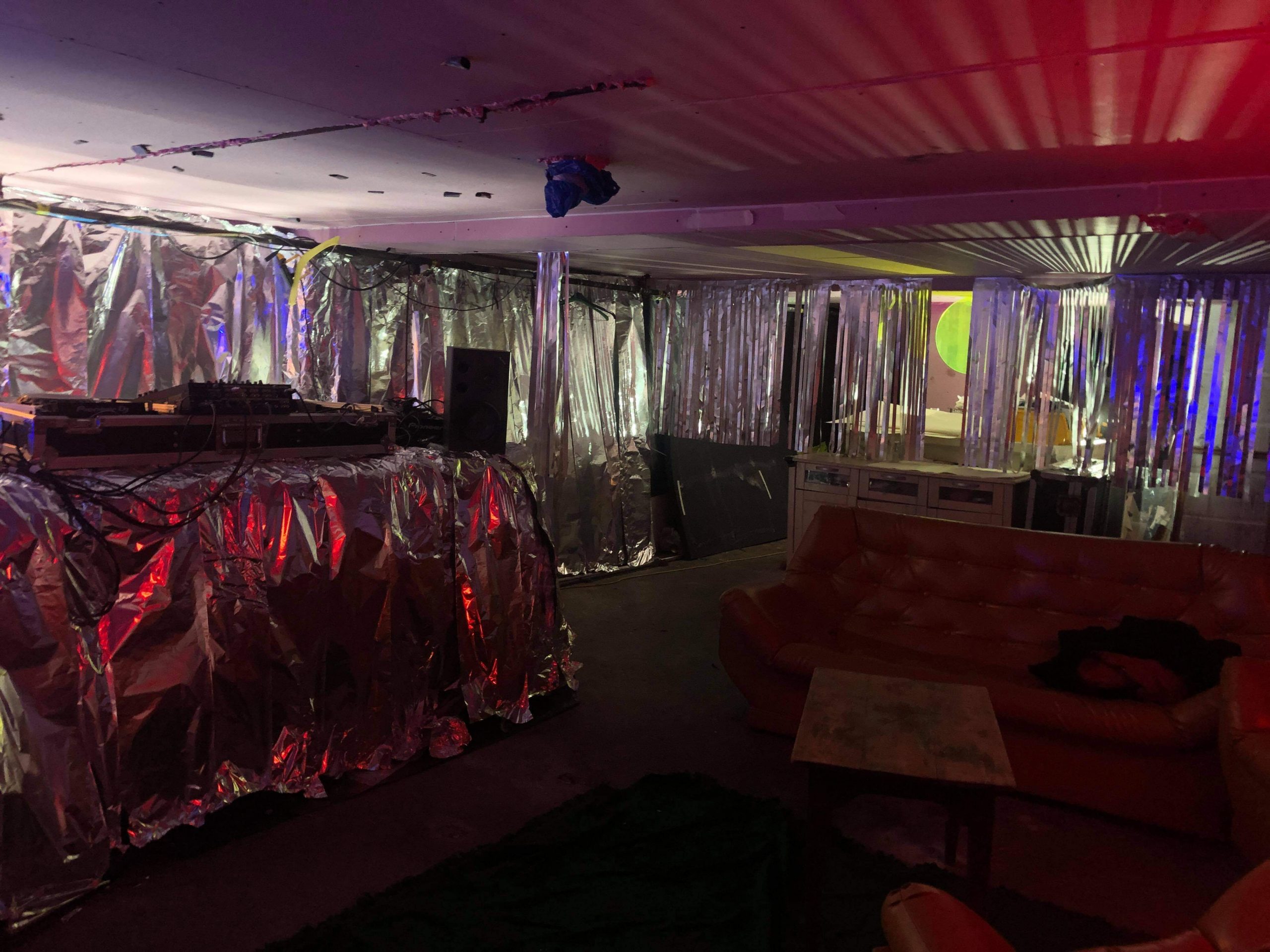
/ Cave do Colectivo Rising Sun
«Nos últimos anos, os espaços de programação têm sido encerrados a um ritmo bastante acelerado», explica Scott Bowley, um dos “músicos inquilinos” do Rising Sun, «e isto terá sido acelerado pela pandemia. É mais importante do que nunca que tenhamos espaços alternativos para que a comunidade criativa se una. Não somos um clube, mas somos um espaço comunitário criativo e uma alternativa viável aos clubes nocturnos tradicionais.»
Para completar o negócio, estão a angariar o resto do dinheiro oferecendo empréstimos aos investidores interessados, que podem esperar um retorno de até 3% se estiverem dispostos a contribuir com pelo menos £1000. Os futuros residentes beneficiarão de um aluguer barato, bem como de acesso ao estúdio – uma combinação de sonho numa cidade com preços tão proibitivos como Londres. Uma onda de interesse dos meios de comunicação social na campanha do colectivo Rising Sun demonstra o quão invulgar é a situação. Mas porque é que não podemos ter, nas grandes cidades, mais empreendimentos cooperativos como este, que asseguram espaço barato tão necessário e segurança financeira para os artistas? Tudo o que é necessário são os edifícios certos — e o Rising Sun não é nada de especial, apenas um bar velho e decadente que precisa de vidros duplos. «O maior obstáculo era encontrar um espaço. Se conseguires encontrar um espaço, a parte mais complicada está ultrapassada», diz Scott.
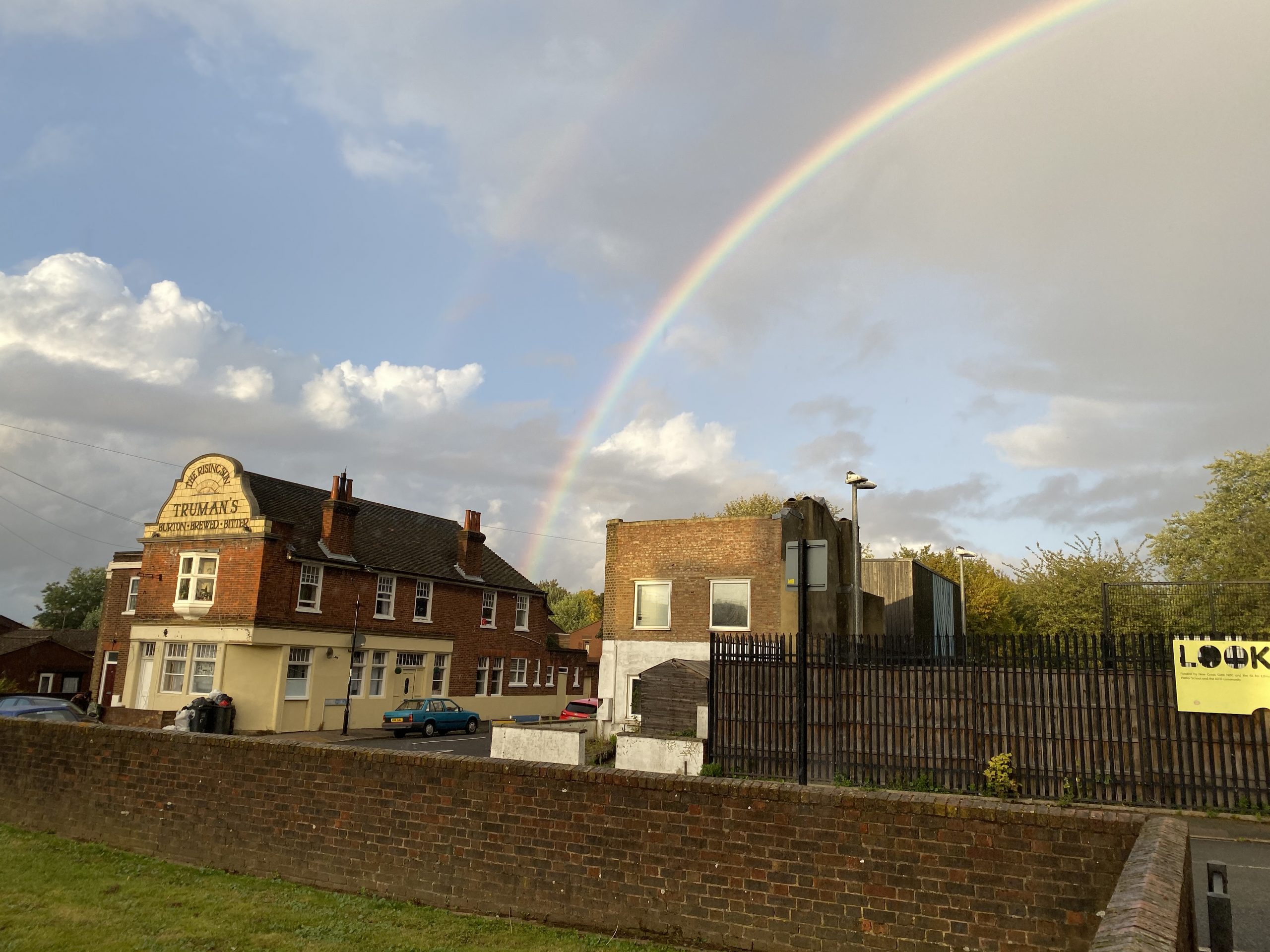
/ Colectivo Rising Sun
Com empresas a reduzir os seus escritórios e mais pessoas a trabalhar remotamente, pode haver oportunidades para ocupar locais privilegiados. Para que serão usados os centros das cidades no futuro, se estivermos a fazer compras online e a trabalhar a partir de casa? Os recintos abandonados do capitalismo tardio estão prontos para o resgate, sendo provável que as autoridades locais estejam desesperadas por inquilinos de qualquer tipo para ajudarem a cobrir os seus orçamentos. No seu recente livro “The Case for Community Wealth Building”, Joe Guinan e Martin O’Neill defendem uma regeneração de base, usando exemplos de Cleveland, Ohio, e Preston, em Lancashire, argumentando que «o local pode ser simultaneamente um local de resistência e um laboratório para o futuro». O trabalho do colectivo Rising Sun, juntamente com cooperativas de habitação e outras parcerias locais que dão prioridade à propriedade e à governação coletivas, poderia ser entendido como uma extensão da «construção de riqueza comunitária». Na visão dos autores, as comunidades ganham primeiro o controlo democrático sobre as suas economias locais, usando depois esse controlo para tornar essas economias mais equitativas. Guinan e O’Neill mostram como as autoridades locais em Cleveland e Preston mudaram as economias das cidades ao apostarem em serviços internos em vez de contratarem serviços públicos ao proponente com a proposta mais baixa. Talvez seja possível imaginar uma extensão hiperlocal desta filosofia, em que os espaços artísticos são propriedade conjunta e não alugados a título privado, em que os patronos de um clube se tornam membros, com uma participação no projecto e uma votação sobre como as coisas são feitas.
Mudar o foco para o nível local pode ser extremamente difícil. Os meios de comunicação social são globais, a Internet é omnipresente, e estamos sempre envolvidos em eventos mundiais para além dos nossos próprios códigos postais. Mas, num futuro destinado a ser marcado pela destruição caótica dos sistemas existentes, mais vale pensarmos em grande nas ferramentas que temos ao nosso dispor.
Este texto foi originalmente publicado na revista “CTM Magazine 2021 – Transformation” e republicado com a gentil permissão do Festival CTM e da autora. https://www.ctm-festival.de/magazine
English Version
Hyperlocal: Smaller-scale scenes and sustainable dance music culture

/ Soup Kitchen Club © Hayley Rawlings
Techno in Tbilisi, singeli in Dar Es Salaam, footwork in Chicago: the allure of a self-contained scene, alive with its own musical language and cultural grammar, ensures that local movements rarely stay local for long. In underground music the idea of the local is highly valued – but always overruled. After discovering something new and exotic, the first impulse is to demand a closer inspection, kickstarting a familiar process of absorption and appropriation.
So what’s so appealing about the idea of a fertile local scene? There’s the novelty, for sure, and our curiosity about what kind of art is being made elsewhere. A local scene also implies a real-life community, an evolving history co-authored by many – a web of affective connections and meaningful relationships, all sparked in IRL spaces where bodies mingle and dance and sweat together. The perceived authenticity of these relationships also adds to their appeal. Lots of people want to be part of a scene like this. As we emerge, gradually and unevenly, from lockdown we have an unexpected opportunity to think about how to build them – not just because they’re novel or exploitable or better fun, but also because we need to start future-proofing.
When the pandemic hit, amid the initial panic there was a note of relief among some working in the music industry. Many tired travellers were grateful for the enforced pause from performing and the mental toll of working in a precarious industry – also perhaps increasingly wary of the ecological damage associated with touring. A long overdue reckoning with the industry’s endemic racism was catalysed (though still barely begun) by the movement for Black lives. Eighteen months later, as it becomes clear that Covid-19 is not going to be eradicated, the possibility of further lockdowns and border closures looms ahead, jeopardising the industry’s fragile recovery. That’s on top of Brexit, which has put up expensive new barriers for the UK’s touring artists, while the extreme weather we’re witnessing around the world, obviously fuelled by climate breakdown, is the backdrop to a new era. We are living through the 21st century we feared: fiery, chaotic, and politically polarised.
Earlier this year the Berlin-based climate action collective Clean Scene made the case[1] for a post-Covid recovery that would take the ecological emergency as a starting point rather than a sidenote. A report from the group showed that the average carbon footprint of a touring DJ is 17 times larger than our individual carbon footprints would have to be in order to keep global temperatures from rising above 1.5 degrees. Calling for greater accountability from an industry that profits from systems which «directly correlate to the effects of climate change», Clean Scene’s report goes beyond individual or technological solutions to call for the complete dismantling of «systems which prioritize money, power, and greed at the expense of the climate, race, gender, and economic inequality». Such proposals seem a far cry from the disjointed return to club protocol we’ve seen so far; getting back on the dancefloor and reconnecting with our community has taken priority over an honest evaluation of our impact on the environment. Perhaps that is right as well as inevitable, at least for now, as we solder ourselves together again.
The past year has placed extreme stress on musicians and music workers as they fight to stay afloat, but has also given us time to consider more serious, structural and long-term responses to the challenges that music scenes are already facing – from rising rents and licensing challenges to safety, inclusions, equity, and simply making ends meet.
One requirement for a revitalised, localised music culture is an emphasis on booking local artists and prioritising residents over touring acts. As a music writer based in the UK – and who hasn’t left the UK for 18 months – it seems logical to frame this discussion through a local lens and mention only those scenes that I know firsthand. Up in Manchester, the basement venue Soup Kitchen is undergoing a brand overhaul with an emphasis on inclusivity and equitability. Now just called Soup, the 200-capacity club is «being a bit more selective about who we work with», according to DJ and producer Henzo, a booker at Soup since 2019. «We want to work with people that share our ideals», he continues, «in terms of the people who use the space and who you would see performing there». The club is also putting a limit on the door price and holding back tickets for those who can’t afford to pay – bold interventions that will also make it harder for promoters to make a profit from an expensive outside booking.
Manchester is a big city but its clubbing community is relatively small. Compared to Berlin, a city that constantly attracts new artists with its promise of cheap space and spare time, Manchester is not necessarily a hotspot for careerists – but that has arguably given rise to a different mentality, where local talent is both appreciated and guarded, and world-class DJs like Tom Boogizm manage to stay under the radar.
In dance music, the economics of the international touring circuit and the costs of putting on an event in an high-rent city have meant that the resident DJ has become a rare bird – even though it’s the clubs with established residents, like Berghain or Bassiani, that are celebrated for their special atmosphere and community feeling. In his essay «Build Your Own Berghain[1]», techno and ambient DJ Chris SSG thinks about why the Berlin club became shorthand for techno excellence, and makes the claim that «it is hard to rival either the talent at Berghain’s disposal or the unique constellation of factors that have allowed for its creation and existence». As he acknowledges, Berghain didn’t forge its success from its booking policy alone. Its dominance is also the result of structural factors that can’t be replicated – like the fact that the building, an enormous former power plant, has been owned by Ostgut Ton since 2011. If Berghain provides a model for success, it’s one of ownership and self-determination.
[1] http://mnmlssg.blogspot.com/2011/03/build-your-own-berghain.html
Cultivating a local scene means (re)engaging with bricks and mortar, licensing and planning laws, local government and institutions. It’s about material conditions and money. In recent years, and particularly during the pandemic when music communities have been dispersed and isolated, the sharp end of political discourse in the industry has focused on the problems of diversity, representation and inclusion. But this attention to who is seen, who is recognised, can end up displacing the deeper and more urgent work of addressing material injustices, leaving us with a sense of having «done politics» while having barely scraped the optics of the situation.
Cultivating a local scene also means taking seriously the uneasy relationship between «us» and «the neighbours», whose concerns about noise, drugs, and crime are better confronted than ignored. Sometimes this may involve fights against redevelopment and gentrification, including fighting on behalf of our neighbours. Sustainable artistic scenes must have a stake in the land, communities, and institutions that surround them.

/ Rising Sun Collective’s Basement
«Venues have been shutting down at quite a rate in the last few years», explains Scott Bowley, one of the tenant-musicians at the Rising Sun, «and this will have been accelerated by the pandemic. It’s more important than ever that we have alternative spaces for the creative community to come together. We’re not a venue, but we are a creative community space and a viable alternative to traditional nightclubs».
To complete the deal, they are raising the rest of the money by offering loanstock to interested investors, who can expect a return of up to 3% if they’re willing to chip in at least £1000. Future residents will benefit from cheap rent as well as studio access – a dream combination in a city as prohibitively expensive as London. A flurry of media interest in the Rising Sun campaign demonstrates just how unusual their situation is. But why can’t we have more co-operative ventures like this, securing much needed cheap space and financial security for artists in big cities? All that’s needed is the right buildings – and the Rising Sun is nothing special, just a shabby old pub that needs double glazing. «The biggest hurdle was finding a space. If you can find a space that’s the trickiest part over,» says Scott.

/ Rising Sun Collective
With companies downsizing their offices and more people working remotely, there may be opportunities to take over prime locations. What will city centres be used for in the future if we’re shopping online and working from home? The abandoned precincts of late capitalism are ripe for rescue, with local authorities likely to be desperate for tenants of any kind to help plug their budgets. In their recent book The Case for Community Wealth Building, Joe Guinan and Martin O’Neill make the case for grassroots regeneration using examples from Cleveland, Ohio, and Preston, Lancashire, arguing that «the local can be both a site of resistance and a laboratory for the future». The work of the Rising Sun collective, along with housing co-operatives and other local partnerships that prioritise joint ownership and governance, could be understood as an extension of »community wealth building.« In their vision, communities first gain democratic control over their local economies, and then use that control to make those economies more equitable. Guinan and O’Neill show how local authorities in Cleveland and Preston have changed the cities’ economies by bringing services in-house rather than contracting out public services to the lowest bidder. Perhaps it is possible to imagine a hyperlocal extension of this philosophy, in which arts venues are jointly owned rather than privately leased, where patrons of a club become members, with a stake in the project and a vote on how things are done.
Shifting focus to the local level can be extremely difficult. Mass media is global, the internet is ubiquitous, and we’re always caught up in world events beyond our own postcodes. But in a future fated to be marked by the chaotic wrecking of existing systems, we might as well think big about the tools we have to hand.
This text was originally published in the CTM Magazine 2021 –Transformation, and republished with kind permission of CTM Festival and the author. https://www.ctm-festival.de/magazine

